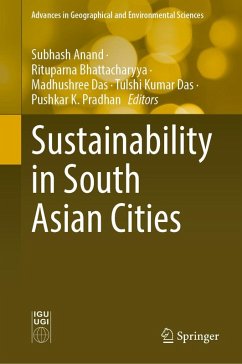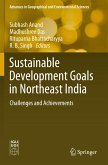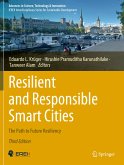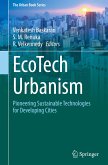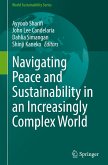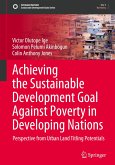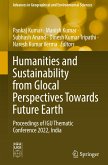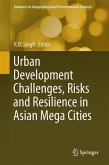Sustainability in South Asian Cities
Herausgegeben:Anand, Subhash; Bhattacharyya, Rituparna; Das, Madhushree; Das, Tulshi Kumar; Pradhan, Pushkar K.
Sustainability in South Asian Cities
Herausgegeben:Anand, Subhash; Bhattacharyya, Rituparna; Das, Madhushree; Das, Tulshi Kumar; Pradhan, Pushkar K.
- Gebundenes Buch
- Merkliste
- Auf die Merkliste
- Bewerten Bewerten
- Teilen
- Produkt teilen
- Produkterinnerung
- Produkterinnerung
This book explores some of the common socio-economic and environmental challenges faced by the cities of South Asia, which remain highly under-researched. South Asia comprises eight nations-India, Bangladesh, Nepal, Sri Lanka, Bhutan, Maldives, Pakistan, and Afghanistan, consisting of a total population of 1.92 billion in 2022. The majority of the cities in these countries are characterized by haphazard urbanization and multi-dimensional poverty alongside its associated ingredients- floods, water scarcity, food crises, poor sanitation, slums and squatter settlements, and pollution, among…mehr
Andere Kunden interessierten sich auch für
![Sustainable Development Goals in Northeast India Sustainable Development Goals in Northeast India]() Sustainable Development Goals in Northeast India83,99 €
Sustainable Development Goals in Northeast India83,99 €![Resilient and Responsible Smart Cities Resilient and Responsible Smart Cities]() Resilient and Responsible Smart Cities171,99 €
Resilient and Responsible Smart Cities171,99 €![EcoTech Urbanism EcoTech Urbanism]() EcoTech Urbanism115,99 €
EcoTech Urbanism115,99 €![Navigating Peace and Sustainability in an Increasingly Complex World Navigating Peace and Sustainability in an Increasingly Complex World]() Navigating Peace and Sustainability in an Increasingly Complex World123,99 €
Navigating Peace and Sustainability in an Increasingly Complex World123,99 €![Achieving the Sustainable Development Goal Against Poverty in Developing Nations Achieving the Sustainable Development Goal Against Poverty in Developing Nations]() Victor Olutope IgeAchieving the Sustainable Development Goal Against Poverty in Developing Nations115,99 €
Victor Olutope IgeAchieving the Sustainable Development Goal Against Poverty in Developing Nations115,99 €![Humanities and Sustainability from Glocal Perspectives Towards Future Earth Humanities and Sustainability from Glocal Perspectives Towards Future Earth]() Humanities and Sustainability from Glocal Perspectives Towards Future Earth138,99 €
Humanities and Sustainability from Glocal Perspectives Towards Future Earth138,99 €![Urban Development Challenges, Risks and Resilience in Asian Mega Cities Urban Development Challenges, Risks and Resilience in Asian Mega Cities]() Urban Development Challenges, Risks and Resilience in Asian Mega Cities127,99 €
Urban Development Challenges, Risks and Resilience in Asian Mega Cities127,99 €-
-
-
This book explores some of the common socio-economic and environmental challenges faced by the cities of South Asia, which remain highly under-researched. South Asia comprises eight nations-India, Bangladesh, Nepal, Sri Lanka, Bhutan, Maldives, Pakistan, and Afghanistan, consisting of a total population of 1.92 billion in 2022. The majority of the cities in these countries are characterized by haphazard urbanization and multi-dimensional poverty alongside its associated ingredients- floods, water scarcity, food crises, poor sanitation, slums and squatter settlements, and pollution, among others. This comprehensive book is contributed by interdisciplinary scholars and includes 25 case studies. The volume brings these socio-economic and environmental challenges to the fore for a better and more nuanced understanding. The book help policymakers to mitigate the challenges and build sustainable cities.
Produktdetails
- Produktdetails
- Advances in Geographical and Environmental Sciences
- Verlag: Springer / Springer Nature Singapore / Springer, Berlin
- Artikelnr. des Verlages: 978-981-97-7454-8
- Seitenzahl: 488
- Erscheinungstermin: 4. März 2025
- Englisch
- Abmessung: 241mm x 160mm x 32mm
- Gewicht: 891g
- ISBN-13: 9789819774548
- ISBN-10: 9819774543
- Artikelnr.: 71282998
- Herstellerkennzeichnung
- Springer-Verlag GmbH
- Tiergartenstr. 17
- 69121 Heidelberg
- ProductSafety@springernature.com
- Advances in Geographical and Environmental Sciences
- Verlag: Springer / Springer Nature Singapore / Springer, Berlin
- Artikelnr. des Verlages: 978-981-97-7454-8
- Seitenzahl: 488
- Erscheinungstermin: 4. März 2025
- Englisch
- Abmessung: 241mm x 160mm x 32mm
- Gewicht: 891g
- ISBN-13: 9789819774548
- ISBN-10: 9819774543
- Artikelnr.: 71282998
- Herstellerkennzeichnung
- Springer-Verlag GmbH
- Tiergartenstr. 17
- 69121 Heidelberg
- ProductSafety@springernature.com
Dr. Subhash Anand is currently a professor of geography at the Department of Geography, Delhi School of Economics, University of Delhi, India. He has more than 25 years of experience in teaching and research and has published 7 books and more than 70 research papers, articles and chapters in journals and books. He specialises in urban environmental issues, sustainability, solid waste management and planning and geotourism. Dr. Anand is the vice president of the Indian Geographical Society (IGS) and the vice chair of the Commission on Geoheritage, International Geographical Union (IGU). He is a series editor of the Advances in Geographical and Environmental Sciences and an associate editor-in-chief of the International Journal of Geoheritage and Parks as well as an editorial board member of many journals. He has held an advanced training workshop, Urban Spatial Planning in Response to Climate Change in Asia, in Taipei and a Commonwealth Geographical Bureau (CGB) workshop, Human Consequences of Climate Change, at the University of Colombo. He has travelled widely to participate in international conferences, seminars and workshops and has delivered lectures in several countries. Dr Rituparna Bhattacharyya is an adjunct professor at the Indian Institute of Technology, Guwahati; a visiting professor at the University of Science and Technology, Meghalaya; and an independent research consultant and Editor-in-Chief (Joint) of the SCOPUS-indexed international journal Space and Culture, India published from the UK. She accomplished her senior fellow position at Advance HE (formerly Higher Education Academy, UK) in 2021. Rituparna is currently the Series Editor for Gender and Violence, Routledge, Taylor and Francis. She also works as an Associate Editor for two international journals. They are Humanities and Social Sciences Communications (nature.com), Springer Nature and Diversity & Inclusion Research published by Wiley. Rituparna was appointed Executive Council member of Cotton University, India, in November 2023. Earlier in 2009, she obtained her Ph.D. from the School of Geography, Politics and Sociology, University of Newcastle, UK. This research was funded by an Overseas Research Scholarship (ORS) and an International Research Scholarship (IRS). In 1994, she received the Jawaharlal Nehru Memorial Award for standing First Class First (Geography Major) from Cotton College (now University). And in 1996, she secured First Class First (in MA, Geography) from Banaras Hindu University. She was also the recipient of the National Merit Scholarship from the Government of India. She has more than 25 years of teaching and research experience. She bears expertise in geohumanities linked to gendered politics, inequalities, poverty, violence, sustainable goals, and development in the global south. She serves as an anonymous journal reviewer of 26 high-quality peer-reviewed journals. Dr. Bhattacharyya volunteers at the Prag Foundation for Capacity Building, a public charitable trust in India, and the Alliance for Community Capacity Building for Northeast India, a UK-registered charity. She has more than 89 publications to her credit. Madhushree Das is currently a Professor at the Department of Geography, Gauhati University Assam, India. She has more than 25 years of experience in teaching and research. Dr Das is a social and cultural Geographer who works in social, cultural, gender, and tribal geography. She has authored three books, edited three more and published more than 55 research papers in national and international journals. She received the international geographical travel grant award thrice to present her research in Durban (South Africa), Cologn (Germany), Szeged (Hungary) and Kyoto (Japan). She was the former General Secretary (elect)of the North East India Geographical Society (2016 to 2018). Besides, she is the executive council member and court member of Cotton University. She has received several awards and honours, including academic gold medal for securing first class first position in MA Geography , the Bhubaneswari Memorial gold medal for standing first in MA degree in all subjects of arts in 1997, the Deepali Barthakur Memorial award from the North East India Geographical Society, (NEIGS), National talent search examination, Government of India in 1989 and Commonwealth geographical bureau award in 2005. Tulshi Kumar Das, Ph.D., is a professor of social work at the Shahjalal University of Science and Technology, Bangladesh. He earned his PhD and MPhil from Jawaharlal Nehru University, New Delhi, India. He was the head of the Department of Social Work at the university for ten years and was the dean of the School of Social Sciences for two years. He has widely published articles in national and international journals and participated in conferences worldwide. He has completed research projects relating to slum culture, domestic violence, natural disasters, street children, micro-credit, food security, ethnicity, human rights, social work education and practice, nationalism, genocide, and the psycho-physical health of Bangladesh police, among others. He worked as a guest lecturer at the Faculty of Social Work and Health, Frankfurt University of Applied Sciences, Germany, and also acted as a visiting fellow at the Centre for Studies of South and South-East Asian Societies, Kazi Nazrul University, West Bengal, India. Professor Das is an editorial board member and a regular reviewer of many international journals. He is involved in 46 social welfare organizations working for marginalized people nationwide. Pushkar K. Pradhan is a professor at the Central Department of Geography, Tribhuvan University. He received his PhD from the Institute of Geography and Regional Science, Klagenfurt University, Austria, an MSc in regional development planning from the Asian Institute of Technology, Thailand, and an MA in geography from the Tribhuvan University, Nepal. Affiliating to Tribhuvan University, Dr. Pradhan has four decades of professional experience in teaching and research. During this period, he held several positions at Tribhuvan University, such as the head of the Central Department of Geography, member of the Academic Council and faculty board member of the Faculty of Humanities and Social Sciences, and chairperson of the Geography Subject Steering Committee. He served as an executive member of the Steering Committees of three Commissions of the International Geographical Union, viz. Marginality, Public Policy and Local Governance, and four IGU conferences were successfully convened in Nepal in 2004, 2007, 2011, and 2019, respectively. He served as a member of the editorial boards of several journals published by the university and academic societies. Dr. Pradhan has published over five dozen research papers and books, participated in over four dozen international and national seminars, and been involved in a lead position in over 40 national and international research works.
Towards Socio-Economic and Environmentally Sustainable Cities of South Asia.- Is the Blue-Green Infrastructure (BGI) key to Sustainable Development of South Asian Cities?.- Challenges for Achieving Sustainable Development Goal 6.1 'safe and affordable drinking water' in developing countries: A Case Study of Patharghata in Bangladesh.- Modelling of Antimicrobial Agent Triclosan (TCS) Transport in Nanofiltration System for Sustainable Design of Drinking Water Treatment Systems for South Asian Countries.- Culinary Landscapes- Understanding the intersections of food cultures in South Asia.- Towards Solving Environmental, Societal, And Economic Teleconnections Between Delhi, Punjab, And Assam.- Making cities sustainable: Tracking economic sustainability in urban India.- Living by the Edges: Existential Vulnerabilities Among the Slum-dwelling Women of Delhi, India.- COVID-19 Induced Family Violence in an Urban Setting in Bangladesh: Prospects for Social Work Interventions.- Going beyond the traditional microcredit approach for socioeconomic development: A case of a slum from Bangladesh.- Growth and development of squatter settlements: a challenge to urban sustainability in Nepal: the case of Kathmandu city.- The COVID-19 Crisis and Indian Cities: Managing Urban Contours in Times of Pandemic.- Representation of Dhaka in The Book of Dhaka: A City in Short Fiction.- Vulnerability and Coping Mechanism of the City Dwellers: A Study of Old Dhaka.- Integrating Accessibility: A Critical Review of the Transportation Policies and Plans in Dhaka.- Informal sector towards urban sustainability in Kathmandu valley, Nepal.- Covid-19 Pandemic and Urban Informal Workforce: Challenges Faced by the Small Entrepreneurs in Silchar Town of Assam, India.- Bolpur: A Historical Eco-Friendly Townscape Promoting Sustainable City.- Pattern of Urbanisation, Its Sustainability and Spatial Set-up of Urban Centers in Uttar Pradesh, India.- Urban Sprawl and Future Land Resource Utilization Projections for Ghaziabad City, Uttar Pradesh, India, Using High- Resolution Remote Sensing Data and GIS Techniques.- Analyzing and Mapping of Change in Water Surface Area Using Remote Sensing Data: case Study of Band-e Amir National Park, Afghanistan.- Land Use/Land Cover Change Dynamics in Rapidly Growing City: A Potential Threat to Sustainability: A Case Study of the Peshawar District of Pakistan.- Impact of bare lands in the cities of Kathmandu valley, Nepal: question for urban environmental sustainability.- Urban growth and urban land use dynamics of Pokhara city, Nepal: challenge to urban sustainability?.- Agriculture practice in Kathmandu valley, Nepal: adaptive strategy or sustainable livelihood?.
Towards Socio-Economic and Environmentally Sustainable Cities of South Asia.- Is the Blue-Green Infrastructure (BGI) key to Sustainable Development of South Asian Cities?.- Challenges for Achieving Sustainable Development Goal 6.1 'safe and affordable drinking water' in developing countries: A Case Study of Patharghata in Bangladesh.- Modelling of Antimicrobial Agent Triclosan (TCS) Transport in Nanofiltration System for Sustainable Design of Drinking Water Treatment Systems for South Asian Countries.- Culinary Landscapes- Understanding the intersections of food cultures in South Asia.- Towards Solving Environmental, Societal, And Economic Teleconnections Between Delhi, Punjab, And Assam.- Making cities sustainable: Tracking economic sustainability in urban India.- Living by the Edges: Existential Vulnerabilities Among the Slum-dwelling Women of Delhi, India.- COVID-19 Induced Family Violence in an Urban Setting in Bangladesh: Prospects for Social Work Interventions.- Going beyond the traditional microcredit approach for socioeconomic development: A case of a slum from Bangladesh.- Growth and development of squatter settlements: a challenge to urban sustainability in Nepal: the case of Kathmandu city.- The COVID-19 Crisis and Indian Cities: Managing Urban Contours in Times of Pandemic.- Representation of Dhaka in The Book of Dhaka: A City in Short Fiction.- Vulnerability and Coping Mechanism of the City Dwellers: A Study of Old Dhaka.- Integrating Accessibility: A Critical Review of the Transportation Policies and Plans in Dhaka.- Informal sector towards urban sustainability in Kathmandu valley, Nepal.- Covid-19 Pandemic and Urban Informal Workforce: Challenges Faced by the Small Entrepreneurs in Silchar Town of Assam, India.- Bolpur: A Historical Eco-Friendly Townscape Promoting Sustainable City.- Pattern of Urbanisation, Its Sustainability and Spatial Set-up of Urban Centers in Uttar Pradesh, India.- Urban Sprawl and Future Land Resource Utilization Projections for Ghaziabad City, Uttar Pradesh, India, Using High- Resolution Remote Sensing Data and GIS Techniques.- Analyzing and Mapping of Change in Water Surface Area Using Remote Sensing Data: case Study of Band-e Amir National Park, Afghanistan.- Land Use/Land Cover Change Dynamics in Rapidly Growing City: A Potential Threat to Sustainability: A Case Study of the Peshawar District of Pakistan.- Impact of bare lands in the cities of Kathmandu valley, Nepal: question for urban environmental sustainability.- Urban growth and urban land use dynamics of Pokhara city, Nepal: challenge to urban sustainability?.- Agriculture practice in Kathmandu valley, Nepal: adaptive strategy or sustainable livelihood?.

